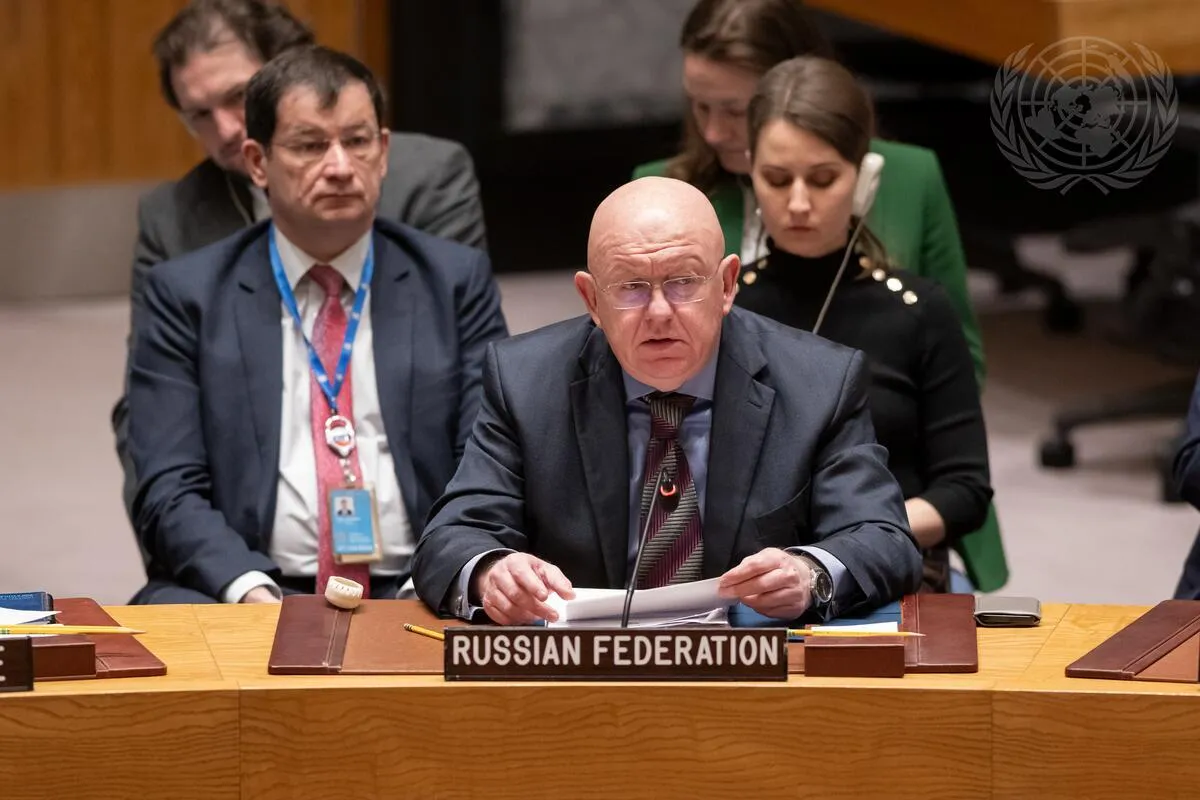Russia’s Permanent Representative to the United Nations Vassily Nebenzia charged the United States with blackmail over the vote in the United Nations Security Council on Friday, Dec. 22 over the crisis in Gaza. While the vote on the resolution ultimately passed 13-0, with two abstentions (U.S. and Russia), Nebenzia charged that the language of the resolution would give Israel a green light for the destruction of Gaza, which was the reason for Russia abstaining on the vote. The United States also abstained, but their abstention was based on the language not going far enough to condemn Hamas and support Israel’s right to self defense.
The resolution was based on an earlier resolution proposed by the United Arab Emirates and Egypt on Dec. 8 that demanded a ceasefire in Gaza and the immediate and unconditional release of all hostages, in order to get humanitarian aid into Gaza. That original resolution was vetoed by the United States, but after pressure from an overwhelming vote to support the U.A.E. and Egypt’s resolution in the UN General Assembly, during an Emergency Special Session on Dec. 12, the UNSC was compelled to take up the resolution again. Today’s vote in the UNSC was originally scheduled for earlier in the week, but was delayed by negotiations around the language in the resolution. The manner of conduct in those negotiations was reflected in the strong language coming from Nebenzia.
Concerning the manner of the negotiations, Nebenzia said that the delay in the vote by the UNSC, originally scheduled for earlier in the week, was due to the United States “delaying the negotiation process on various pretexts, evading normal transparent talks.” “dragging out the vote and deviating from normal transparent work.” He accused the United States delegation of resorting to “to their favorite tactics of pressure, blackmail and ‘arm-twisting’ in order to give Council members a last-minute ultimatum—the Council meekly accepts a Washington-friendly text or else the United States blocks adoption of whatever other product.”
Nebenzia described “The draft that has been put to a vote was already toothless from the very start…. The United States actually took over the drafting and usurped the work on the text while ‘twisting the arms’ of the delegations of regional states in behind-the-scenes contacts. Under American pressure, the text kept losing important provisions with each new edition. As a result, the version that was put to a vote today turned out to be extremely emasculated….”
The subject of the manipulation resulted in what Nebenzia said was an extremely dangerous element for the future of Gaza: “Instead of language about an immediate cessation of violence, the [operative paragraph] OP2 contains an ambiguous phrase calling on the parties to ‘create conditions for a cessation of hostilities.’” Nebenzia charged that the ambiguous language would lead to Israel’s “cynical” interpretation that the “destruction, displacement or exile of the people of Gaza … will also create the conditions for the cessation of hostilities.”
In order for the UNSC to “save face,” as Nebenzia said, he proposed an amendment that would change the wording back to the text that appeared earlier in the week. Nebenzia proposed that instead of the wording, to replace “and in this regard calls for urgent steps to immediately allow safe, unhindered and expanded humanitarian access and to create the conditions for a sustainable cessation of hostilities” with “and in this regard calls for an urgent suspension of hostilities to allow safe and unhindered humanitarian access, and for urgent steps towards a sustainable cessation of hostilities.”
That subtle, yet significant, change in the wording of the resolution, resulted in the United States to not veto and thereby kill Nebenzia’s proposed amendment.
While the UNSC would go on to vote for the resolution 13-0, even with the 2 abstentions coming from the United States and Russia, the vote in favor was in part based on hopes that the opening of new aid corridors and the appointment of an official to monitor the progress would alleviate the humanitarian crisis, and also in part to preserve some sense of functionality within the UNSC—which has come under immense pressure for its previous failures, due to the U.S. veto on previous resolutions.
Dai Bing, chargé d’affaires of China’s permanent mission to the United Nations, told the Security Council that given the humanitarian catastrophe in Gaza, the resolution offers “at least a glimmer of hope” for more and faster delivery of aid to Gaza. He added that “whether this glimmer of hope can be truly felt by the people of Gaza in the midst of this disaster also depends on whether the resolution can be effectively implemented.”
After the vote, Nebenzia also concluded his remarks stating that “no matter how much the United States resists in defending its main Middle Eastern ally, the Council will return to this issue and will clearly and unequivocally demand a cessation of hostilities.” “whatever the resistance may be and however much they might protect their main ally in the region by the United States, the UNSC will get back to this issue and unambiguously demand a cessation of hostilities.”
Clearly, this is not the last of this fight at the United Nations over the issue of the ceasefire, but the battle lines were made much clearer today, and with grace that “glimmer of hope” has immediate tangible results to the dire humanitarian situation.



